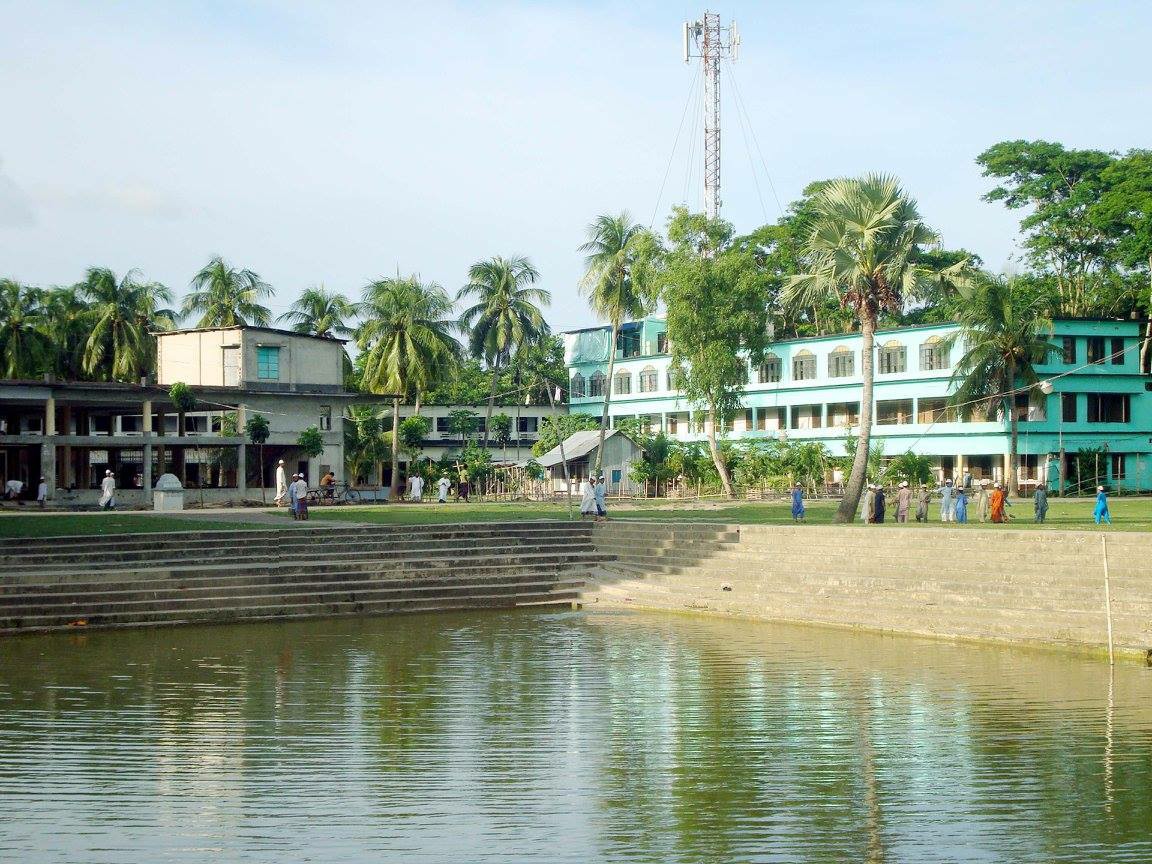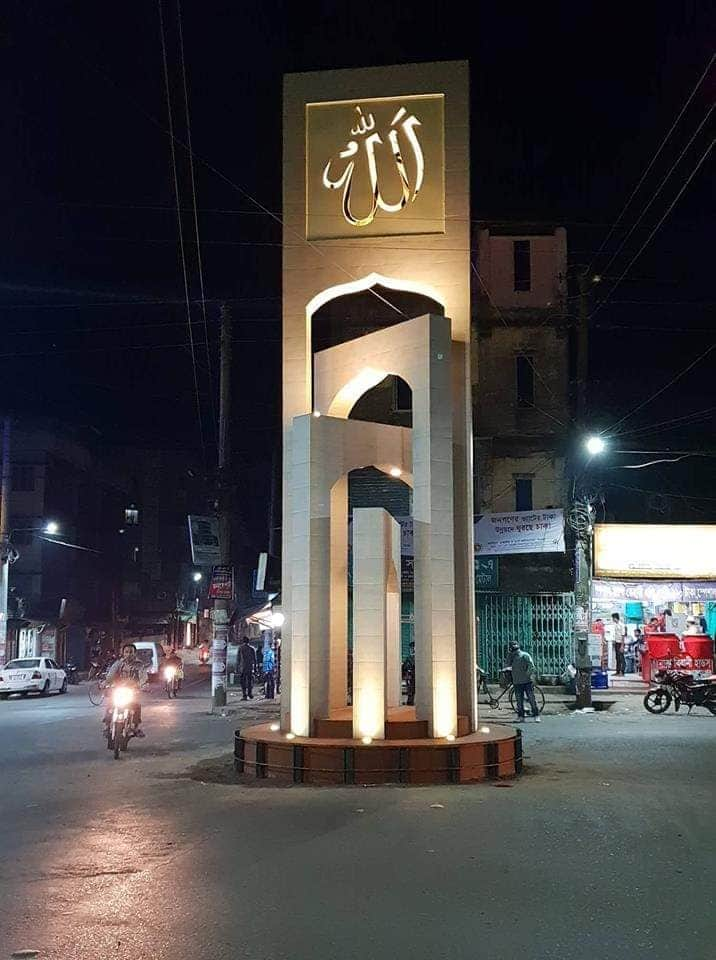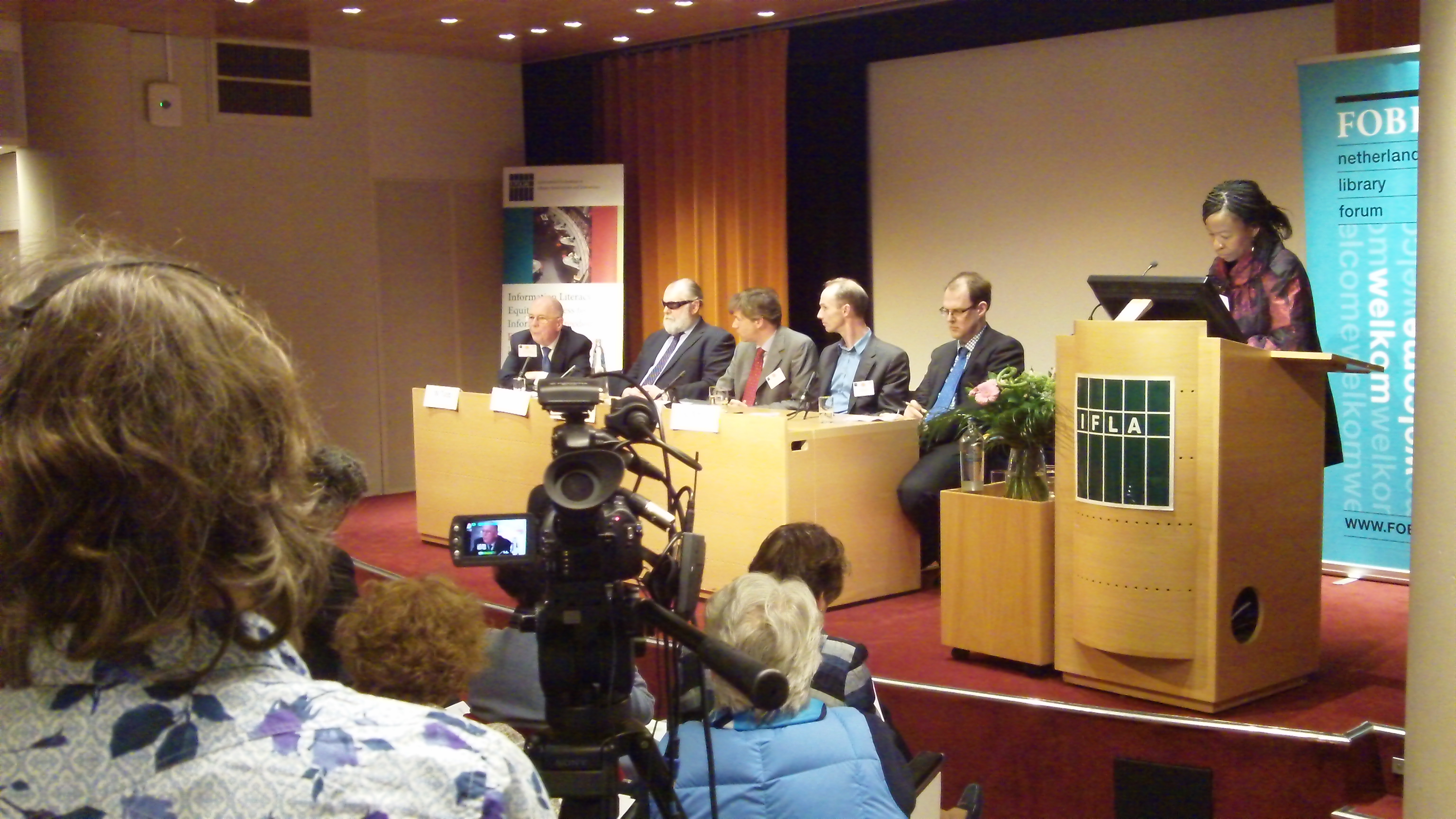|
Abul Hasan Jashori
Abul Hasan Jashori ( bn, আবুল হাসান যশোরী; 1918 – 8 July 1993) was a Bangladeshi Islamic scholar, politician, author, teacher and freedom fighter. He was the founding principal and Shaykh al-Hadith of the Jamia Ezazia Darul Uloom Jessore institution. Early life and education Abul Hasan was born in 1918, to a Bengali Muslim family in the village of Bhabanipur in Harinakunda, Jhenaidah, then located under the Jessore District of the Bengal Province. His father's name was Janab Ali Bishwas. His early education began at the local village primary school, before joining the Magura High School where he completed his matriculation and enrolled at the Magura College. In 1937, he moved to Delhi to obtain further Islamic studies at the Fatehpur Madrasah and Madrasah-e-Rahmatiyyah. After spending six years in Delhi, he was then admitted to Darul Uloom Deoband where he studied under the likes of Hussain Ahmed Madani, Ibrahim Bailyavi, Izaz Ali Amrohi and Sha ... [...More Info...] [...Related Items...] OR: [Wikipedia] [Google] [Baidu] |
Hussain Ahmed Madani
Hussain Ahmad Madani (6 October 1879 – 5 December 1957) was an Indian Islamic scholar, serving as the principal of Darul Uloom Deoband. He was among the first recipients of the civilian honour of Padma Bhushan in 1954.The rise and fall of the Deoband movement The Nation (newspaper), Published 27 June 2015, Retrieved 19 July 2017 Madani played a key role in cementing the Congress-Khilafat Pact in the 1920s and "Through a series of lectures and pamphlets during the 1920s and 1930s, Madani prepared the ground for the cooperation of the Indian Ulama with the Indian National Congress." His work '' |
Muhaddith
Hadith studies ( ar, علم الحديث ''ʻilm al-ḥadīth'' "science of hadith", also science of hadith, or science of hadith criticism or hadith criticism) consists of several religious scholarly disciplines used by Muslim scholars in the study and evaluation of the Islamic hadith—i.e. the record of the words, actions, and the silent approval of the Islamic prophet, Muhammad. Determining authenticity of hadith is enormously important in Islam because along with the Quran, the ''Sunnah'' of the Islamic prophet—his words, actions, and the silent approval—are considered the explanation of the divine revelation ('' wahy''), and the record of them (i.e. hadith) provides the basis of Islamic law (Sharia). In addition, while the number of verses pertaining to law in the Quran is relatively few, hadith give direction on everything from details of religious obligations (such as ''Ghusl'' or ''Wudu'', ablutions An-Nawawi, ''Riyadh As-Salihin'', 1975: p.203 for ''salat'' pray ... [...More Info...] [...Related Items...] OR: [Wikipedia] [Google] [Baidu] |
Islamic Scholar
In Islam, the ''ulama'' (; ar, علماء ', singular ', "scholar", literally "the learned ones", also spelled ''ulema''; feminine: ''alimah'' [singular] and ''aalimath'' [plural]) are the guardians, transmitters, and interpreters of religious knowledge in Islam, including Islamic doctrine and law. By longstanding tradition, ulama are educated in religious institutions ''(madrasas)''. The Quran and sunnah (authentic hadith) are the scriptural sources of Sharia, traditional Islamic law. Traditional way of education Students do not associate themselves with a specific educational institution, but rather seek to join renowned teachers. By tradition, a scholar who has completed his studies is approved by his teacher. At the teacher's individual discretion, the student is given the permission for teaching and for the issuing of legal opinions ''(fatwa)''. The official approval is known as the ''Ijazah, ijazat at-tadris wa 'l-ifta'' ("license to teach and issue legal opinion ... [...More Info...] [...Related Items...] OR: [Wikipedia] [Google] [Baidu] |
De Gruyter
Walter de Gruyter GmbH, known as De Gruyter (), is a German scholarly publishing house specializing in academic literature. History The roots of the company go back to 1749 when Frederick the Great granted the Königliche Realschule in Berlin the royal privilege to open a bookstore and "to publish good and useful books". In 1800, the store was taken over by Georg Reimer (1776–1842), operating as the ''Reimer'sche Buchhandlung'' from 1817, while the school’s press eventually became the ''Georg Reimer Verlag''. From 1816, Reimer used the representative Sacken'sche Palace on Berlin's Wilhelmstraße for his family and the publishing house, whereby the wings contained his print shop and press. The building became a meeting point for Berlin salon life and later served as the official residence of the president of Germany. Born in Ruhrort in 1862, Walter de Gruyter took a position with Reimer Verlag in 1894. By 1897, at the age of 35, he had become sole proprietor of the h ... [...More Info...] [...Related Items...] OR: [Wikipedia] [Google] [Baidu] |
International Federation Of Library Associations And Institutions
The International Federation of Library Associations and Institutions (IFLA) is the leading international body representing the interests of people who rely on libraries and information professionals. An independent, non-governmental, not-for-profit organization, IFLA was founded in Scotland in 1927 and maintains headquarters at the National Library of the Netherlands in The Hague. IFLA sponsors the annual IFLA World Library and Information Congress, promoting universal and equitable access to information, ideas, and works of imagination for social, educational, cultural, democratic, and economic empowerment. IFLA also produces several publications, including IFLA Journal. IFLA closely partners with UNESCO, resulting in several jointly produced manifestos. IFLA is also a founding member of Blue Shield, which works to protect the world's cultural heritage when threatened by wars and natural disaster. History IFLA was founded in Edinburgh, Scotland, on 30 September 1927, when li ... [...More Info...] [...Related Items...] OR: [Wikipedia] [Google] [Baidu] |
Anwarul Karim Jashori
Anwarul is a given name. Notable people with the name include: *Kazi Anwarul Haque (1909–2001), Bangladeshi police officer, bureaucrat, and technocrat minister *Sheikh Anwarul Haq (1917–1995), Pakistani jurist and an academic, Chief Justice of Pakistan 1977–1981 *M Anwarul Azim (1931–1971), Bengali industrial administrator, killed in the Bangladesh Liberation war *Anwarul Karim Chowdhury (born 1943), Bangladeshi diplomat noted for work on development in the poorest nations, global peace and the rights of women and children *Shamsul Anwarul Huq (born 1944), Rohingya academic, pro-democracy activist and former politician in Myanmar * Anwarul Iqbal (1950–2015), adviser of 2007–2009 interim Caretaker Government of Bangladesh *Anwarul Haque (1956–2017), Bangladesh Supreme Court justice, Chairman of International Crimes Tribunal-1 * Anwarul Momen, two star rank Bangladesh Army officer and GOC of 17th Infantry Division * Anwarul Kabir Talukdar, former politician of Bangladesh ... [...More Info...] [...Related Items...] OR: [Wikipedia] [Google] [Baidu] |
Jamia Ezazia Darul Uloom Jessore
Jamia (جامعة ''jāmi‘a''; also ''jamiya'' 'h'' is the Arabic word for ''gathering''. It can also refer to a book Al-Jami'a or a mosque, or more generally, a university. In the latter sense it refers in official usage to a modern university, based on the Western model, as opposed to the medieval madrasa."Djamia", in ''Encyclopaedia of Islam'', 2nd edition, Brill, 2012 The term seems to be a translation of "university" or the French "université" and emerged in the middle of the 19th century; the earliest definite use in this sense appears in 1906 in Egypt Egypt ( ar, مصر , ), officially the Arab Republic of Egypt, is a transcontinental country spanning the northeast corner of Africa and southwest corner of Asia via a land bridge formed by the Sinai Peninsula. It is bordered by the Mediter .... References Islamic terminology {{Islam-studies-stub ... [...More Info...] [...Related Items...] OR: [Wikipedia] [Google] [Baidu] |
Jamiat Ulema-e-Islam
Jamiat Ulema-e-Islam ( ur, جمیعت علماءِ اسلام, abbreviated as JUI) was founded by Shabbir Ahmad Usmani as an offshoot of the Jamiat Ulema-e-Hind (JUH) on 26 October 1945. History The original Jamiat Ulema-e-Hind was formed in British India in 1919.Jamiat Ulema-e-Islam - Fazal Dawn (newspaper), Published 5 April 2013, Retrieved 3 March 2020 After the death of Shabbir Ahmad Usmani in 1949, his close associate replaced him as head or of JUH. Then |
Jamiat Ulema-e-Islam Bangladesh
Jamiat Ulema-e-Islam Bangladesh (Bengali: জমিয়তে উলামায়ে ইসলাম বাংলাদেশ) is a Bangladeshi Islamist Party registered with Bangladesh Election Commission. Jamiat Ulema-e-Islam Bangladesh was a member of the Islamist 20-Party alliance. It was a member of Islami Oikya Jote and which it left in 2008. History Muhammad Wakkas, Secretary General of Jamiat Ulema-e-Islam Bangladesh, was elected to parliament in 1986 and 1988 from Jessore-5 as a candidate of Jatiya Party. He served as the Minister of Religious Affairs in the Cabinet of President Hussain Mohammad Ershad. In 2016, the Jamiat Ulema-e-Islam Bangladesh organized a protest against Islamic militancy in Dhaka. In 2017, Hefazat-e-Islam Bangladesh sought nominations from Jamiat Ulema-e-Islam Bangladesh, and other Islamist parities, to contest the upcoming General Election in 2018. Nur Hossain Kasemi, Secretary General of Jamiat Ulema-e-Islam Bangladesh criticised the gover ... [...More Info...] [...Related Items...] OR: [Wikipedia] [Google] [Baidu] |
All-India Muslim League
The All-India Muslim League (AIML) was a political party established in Dhaka in 1906 when a group of prominent Muslim politicians met the Viceroy of British India, Lord Minto, with the goal of securing Muslim interests on the Indian subcontinent. The party arose out of the need for the political representation of Muslims in British India, especially during the Indian National Congress-sponsored massive Hindu opposition to the 1905 partition of Bengal. During the 1906 annual meeting of the All India Muslim Education Conference held in Israt Manzil Palace, Dhaka, the Nawab of Dhaka, Khwaja Salimullah, forwarded a proposal to create a political party which would protect the interests of Muslims in British India. Sir Mian Muhammad Shafi, a prominent Muslim leader from Lahore, suggested the political party be named the 'All-India Muslim League'. The motion was unanimously passed by the conference, leading to the official formation of the All-India Muslim League in Dhaka. It remai ... [...More Info...] [...Related Items...] OR: [Wikipedia] [Google] [Baidu] |
Shafi Usmani
Muḥammad Shafī‘ ibn Muḥammad Yāsīn ‘Us̱mānī Deobandī ( ur, ; ar, محمد شفيع بن محمد ياسين العثماني الديوبندي, ''Muḥammad Shafī‘ ibn Muḥammad Yāsīn al-‘Uthmānī ad-Diyūbandī''; 25 January 18976 October 1976), often referred to as Mufti Muhammad Shafi, was a Pakistani Sunni Islamic scholar of the Deobandi school of Islamic thought. A Hanafi jurist and mufti, he was also an authority on shari'ah, hadith, Qur'anic exegesis, and Sufism. Born in Deoband, British India, he graduated in 1917 from Darul Uloom Deoband, where he later taught hadith and held the post of Chief Mufti. He resigned from the school in 1943 to devote his time to the Pakistan Movement. After the independence he moved to Pakistan, where he established Darul Uloom Karachi in 1951. Of his written works, his best-known is ''Ma'ariful Qur'an'', a commentary on the Qur'an. Birth and early childhood Muhammad Shafi, son of Muhammad Yasin, was born on 2 ... [...More Info...] [...Related Items...] OR: [Wikipedia] [Google] [Baidu] |




